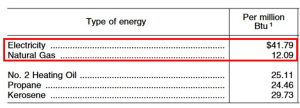Happer, Lindzen, CO2 Coalition Comment on the Department of Energy’s Proposed Gas Stove Standards
The Department of Energy (DOE) is proposing to revise their standards for natural gas stoves. This revision is just one of the 110 other “energy efficiency” actions on other household items including furnaces, water heaters, clothes washers and dryers and lightbulbs that would restrict your ability to freely choose which appliance to purchase and use.
The practical effect of the new standards is banning gas stoves by regulation and switching people from gas to electric stoves. Replacing gas stoves with electric stoves is also the purpose of the $840 rebate in the Orwellian-named Inflation Reduction Act. The DOE itself admits that electricity costs 3.5 times the cost of natural gas per energy unit, $42 versus $12 for natural gas per million BTU, so the cost of cooking will necessarily increase cooking costs greatly. On top of that, DOE estimates that the new regulations will increase equipment costs for consumers by $2.5 million.

Average Unit Cost of Energy, 87 Fed. Reg. 12681, 12682 (Mar. 7, 2022)
On April 17th, the CO2 Coalition filed an extensive 23-page comment for the DOE on these economically destructive and freedom-crippling regulations.
In it we conclude that “…the scientific method proves there is no reliable science supporting the proposed standards based on the proposition that electric stoves are more energy efficient than gas stoves” and the estimates “used in the proposal are fatally flawed science.”
“Thus, the DOE standards must not be adopted and the IWG SCC Estimates must not be used. If adopted, the DOE standards should be ruled invalid by the courts.”
Read the entire Coalition comment here.

Gas stoves for me, but not for thee.
